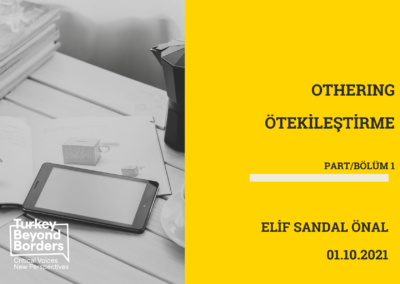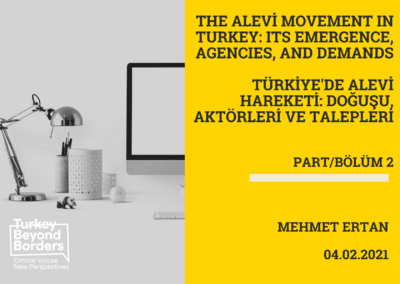Dr. Elif Sandal Önal
- Title: Othering (Part 1)
- Başlık: Ötekileştirme (Bölüm 1)
- Date/Tarih: 1 Oct/Ekim 2021
Recommended Readings / Önerilen Okumalar
- Abrams, D., & Hogg, M. A. (1998). Prospects for research in group processes and intergroup relations. Group Processes & Intergroup Relations, 1(1), 7-20.
- Bar-Tal, D., & Hammack, P. L., Jr. (2012). Conflict, delegitimization, and violence. In L. R. Tropp (Ed.), Oxford handbook of intergroup conflict (pp. 29 –52). New York, NY: Oxford University Press.
- Barth, F. (1969). Ethnic Groups and Boundaries: The Social Organization of Culture Difference. Bergen: Universitetsforlaget.
- Bilali, R. (2012). Identity centrality and in-group superiority differentially predict reactions to historical victimization and harmdoing. International Journal of Conflict and Violence (IJCV), 6(2), 321-337.
- Brewer, M. B. (2001). The many faces of social identity: Implications for political psychology. Political Psychology, 22(1), 115-125.
- Brewer, M. B. (2007). The importance of being we: Human nature and intergroup relations. American psychologist, 62(8), 728-738.
- Brewer, M. B. (2017). Intergroup discrimination: Ingroup love or outgroup hate? In C. G. Sibley & F. K. Barlow (Eds.), The Cambridge handbook of the psychology of prejudice (pp. 90–110). Cambridge University Press.
- Çoban-Keneş, H. (2015). Yeni Irkçılığın “Kirli” Ötekileri: Kürtler, Aleviler, Ermeniler. Ankara: Dipnot Yayınları.
- Dervin, F. (2015). Discourses of othering. The international encyclopedia of language and social interaction, 1-9.
- Erdoğan, E., & Uyan-Semerci, P. (2018). Fanusta diyaloglar: Türkiye’de kutuplaşmanın boyutları. Istanbul Bilgi Üniversitesi Yayınları.
- Eriksen, T. H. (2015). The Meaning of ‘We’. In P.Kraus and P.Kivisto (Eds). The challenge of minority integration: politics and policies in the Nordic nations. Walter de Gruyter GmbH & Co KG. 2-21.
- Gillespie, A. (2007). Collapsing self/other positions: Identification through differentiation. British Journal of Social Psychology, 46(3), 579-595.
- Golec de Zavala, A. (2011). Collective narcissism and intergroup hostility: The dark side of ‘in‐group love’. Social and Personality Psychology Compass, 5(6), 309-320.
- Haslam, N. (2006). Dehumanization: An integrative review. Personality and social psychology review, 10(3), 252-264.
- Hewer, C.J. & Lyons, E. (2019). Identity. In C.J. Hewer & E. Lyons (Eds.) Social psychological approach of political psychology (pp 93-114). Wiley.
- Huddy, L. (2001). From social to political identity: A critical examination of social identity theory. Political Psychology, 22(1), 127-156.
- Küpper, B. & Zick, A. (2014). Group-Focused Enmity: Prevalence, correlations, and causes of prejudices in Europe. In P.Nesbitt-Larking, C.Kinvall, T.Capelos, & H.Dekker (Eds.) The Palgrave Handbook of Global Political Psychology. Palgrave MacMillan.
- Noor, M., Vollhardt, J. R., Mari, S., & Nadler, A. (2017). The social psychology of collective victimhood. European Journal of Social Psychology, 47(2), 121-134.
- Reicher, S., Haslam, S. A., & Rath, R. (2008). Making a virtue of evil: A five‐step social identity model of the development of collective hate. Social and Personality Psychology Compass, 2(3), 1313-1344.
- Roccas, S., Sagiv, L., Schwartz, S., Halevy, N., & Eidelson, R. (2008). Toward a unifying model of identification with groups: Integrating theoretical perspectives. Personality and social psychology review, 12(3), 280-306.
- Staerklé, C. (2013). Political lay thinking as representations of social order. Culture and political psychology: A societal perspective, 7, 49-74.
- Stephan, W. S., & Stephan, C. W. (2013). An integrated threat theory of prejudice. In S. Oskamp (Ed.) Reducing prejudice and discrimination.‘The Claremont Symposium on Applied Social Psychology’ (pp. 33-56). Psychology Press.
- Tajfel, H., & Turner, J. C. (1979). An integrative theory of intergroup conflict. In W. G. Austin & S. Worchel (Eds.). The social psychology of intergroup relations (pp. 33–47). Monterrey, CA: Brooks-Cole.
- Uyan-Semerci, P., Erdoğan, E. and Sandal-Önal, E. (2017). “Biz”liğin aynasından yansıyanlar: Türkiye gençliğinde kimlikler ve ötekileştirme. İstanbul Bilgi Üniversitesi Yayınları.
- Türkiye’de Kutuplaşmayı Azaltmaya Yönelik Stratejiler ve Araçlar Projesi: https://www.turkuazlab.org/




